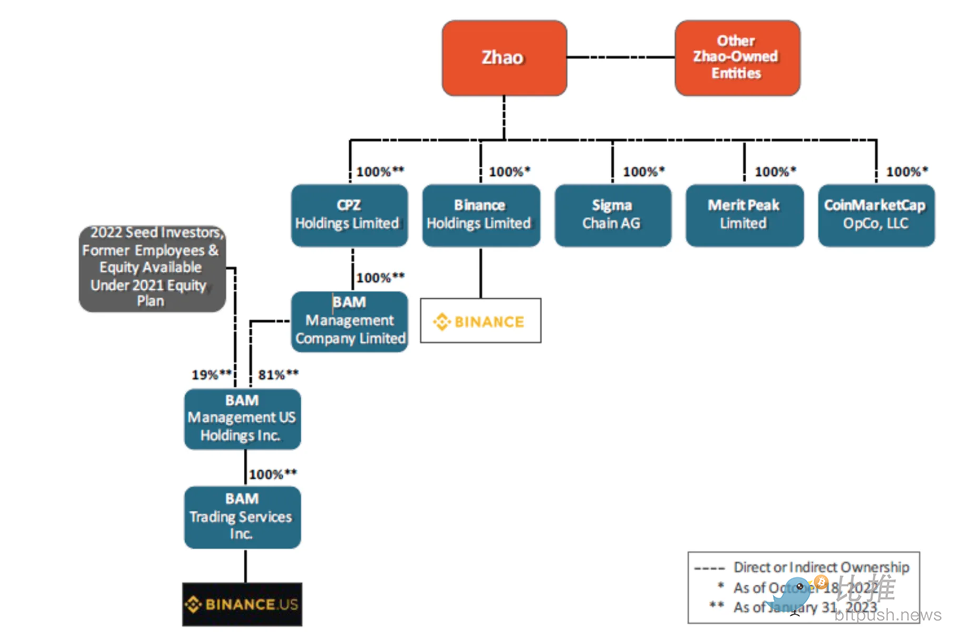On June 5, 2023, the U.S. Securities and Exchange Commission (SEC) filed a 13-count indictment against the Coinan entity and founder Changpeng Zhao (CZ) for, among other things, operating an illegal trading platform in the United States; operating unregistered exchanges, broker-dealers, and clearing agencies; misuse of customer funds; and unregistered issuance and sale of securities.
In a 136-page lawsuit filed in federal court in the District of Columbia, the SEC detailed the details of the violations by Coinan and Changpeng Zhao. intent to evade the law, and the public should be careful not to invest any of their hard-earned assets in these illegal platforms."
Commingling of Customer Funds, Hundreds of Millions of Dollars in Laundered Transactions
Similar to the allegations against former Cryptocurrency competitor FTX and its founder Sam Bankman-Fried, the SEC alleges that CZ and Cryptocurrency exercised control over customer assets by allowing them to commingle customer assets or transfer them at will, including to an entity known as Sigma Chain, which CZ owns and controls.
The filing further alleges that BAM Trading and BAM Management US Holdings, Inc. (BAM Management) misled investors about non-existent trading controls on the Binance.US platform, and that Sigma Chain engaged in manipulative trading by artificially inflating the platform's trading volume for only the period January 1, 2022 through June 23, 2022. Between January 1, 2022 and June 23, 2022 alone, Sigma Chain accounts made clean trades in 48 of the 51 newly listed crypto assets.
In addition, the complaint alleges that the defendants commingled and sent billions of dollars of investor assets to another company, Merit Peak Limited, which is controlled by Coinan founder Changpeng Zhao and appears to have been used to buy and sell cryptocurrencies.
CZ and its holding company allegedly control 100% of the various entities of Binance and Binance US, and the following is a chart of the equity structure of the Coinan entities:

The SEC also alleges that at least $145 million was transferred from Binance.US to Sigma Chain's account by 2021. Another $45 million was deposited into the account from a Nevada trust related to Binance.US, and Sigma Chain also used $11 million from the account to purchase a yacht.
Also of note, similar to the murky structure of FTX and FTX.US, the SEC says that Coin has access to Binance.US's wallet and assets, as well as the U.S. entity's custody vehicle and private keys. Until at least December 2022, Cryptocurrency is also the designated custodian of crypto assets deposited, held, traded and/or accrued on the Binance.US platform. Zhao Changpeng signed off on a number of decisions related to trading services on the Binance.US platform, including the customer account opening process, front-end access development, and the creation of reserves to cover ACH deposits.
The SEC asked the court to order an immediate "verified" accounting of Binance's and Binance.US's finances, the freezing and return of assets, the preservation of documents, and the appointment of a receiver for Binance's assets.
Binance operated as an unregistered exchange
The SEC stated, "With respect to the Binance.US platform, Binance acted as an exchange with BAM Trading, BAM Trading acted as a broker, and Binance and BAM Trading each acted as a clearing agency and were not registered."
CZ is also accused of violating the Exchange Act "as the controller of Binance and BAM Trading. Under the leadership and control of Changpeng Zhao, Binance and BAM Trading unlawfully provided three basic securities market functions - exchange, broker-dealer, and clearing agency - on the Binance platform without registering with the SEC," the filing states. were acutely aware that U.S. law required registration for these functions, but they chose not to register, so they could evade critical regulatory oversight designed to protect investors and markets."
According to the filing, Binance's chief compliance officer had told a colleague in 2018, "Dude, we're an unlicensed stock exchange in the U.S."
Circumventing regulation to solicit U.S. customers
Part of the SEC's lawsuit refers to the so-called "Taiji" documents, which Forbes originally reported in 2020, as what appears to be a plan for Cryptocurrency to officially exit the U.S. market while still maintaining a presence through an affiliate. Cryptocurrency initially sued Forbes over the report in November 2020, before dropping the suit in February 2021.
The lawsuit cites internal Cryptocurrency employees who said they had discussed ways to allow U.S. customers to trade on binance.com. The document quotes the CCO of Cryptocurrency as saying, "On the surface we don't have U.S. users, but in reality, we should be engaging them in other creative ways."
The SEC says, "In effect, Coin implemented much of the Taiji scheme, with Zhao and Binance maintaining substantial involvement and control over the U.S. entity, and behind the scenes, Zhao directed Binance to allow and conceal continued access to Binance.com for many high-value U.S. customers. "
The complaint alleges that from June 2018 through July 2021, Binance.US operated its own over-the-counter trading desk with $11.6 billion in revenue, most of which came from transaction fees, and for two years its only counterparty was Alameda Research, founded by FTX founder Sam Bankman-Fried.
Selling unregistered securities, at least 12 tokens are securities
The SEC considers the pledged investment products available on BNB, BUSD and Binance.US to count as unregistered securities. It also said BAM Trading's pledge program is an investment contract and falls under its definition of a security.
The filing alleges that Binance and BAM Trading illegally engaged in the offering and sale of unregistered cryptoasset securities, including Binance's own BNB and BUSD, as well as Binance's earnings programs BNB Vault and Simple Earn, and so-called "pledged" investment programs available on the Binance.US platform The SEC has named 12 tokens in the lawsuit as "pledged" investments.
The SEC refers to 12 tokens as securities in the lawsuit, namely BNB, BUSD, Solana (SOL), Cardano (ADA), Polygon (MATIC), Filecoin (FIL), Cosmos Hub (ATOM), The Sandbox (SAND), Decentraland ( MANA), Algorand (ALGO), Axie Infinity (AXS), and Coti (COTI).
The SEC says the list is not exhaustive: "Since the launch of the Binance platform, Defendants have been able to trade cryptoassets on these platforms, which are offered and sold as investment contracts and therefore as securities."
Notably, the SEC did not classify Ether as a security in the lawsuit. As previously reported by BizTrust, SEC Chairman Gary Gensler declined to specify whether ETH was a security during a nearly five-hour hearing in April.
What is the SEC's purpose?
Binance was founded in 2017 and has quickly grown to become a headliner in the crypto space. As of last month, more than 40 percent of crypto transactions were made through the Cryptocurrency platform, according to data provider CCData. The case is wide-ranging and has the potential to reshape the landscape of power and wealth in the crypto space.
The SEC and CFTC have been engaged in a turf battle to determine who becomes the primary regulator of crypto trading, with the CFTC filing charges in March that accused Coinan and its founder Changpeng Zhao of offering unregistered crypto derivatives in violation of federal law, and many of the allegations in the SEC's lawsuit are similar to the CFTC's complaint, which for the SEC is another major bet that a U.S. court will agree that it has jurisdiction over the crypto industry. For the SEC, this lawsuit is another major bet that a U.S. court will agree that it has jurisdiction over the crypto industry.
In the lawsuit, the SEC seeks to prevent Binance, Binance.US and "their respective agents" from continuing to violate federal law by requiring the defendants to pay "all ill-gotten gains" plus pre-judgment interest. Some optimists believe that the charges are civil and that Binance could end up paying a significant fine.
The SEC, in its filing, said it wants to bar CZ from serving as an officer or director of any issuer of securities and prevent Binance, Binance.US and CZ from participating or trading in any securities, including cryptoasset securities. This also includes preventing the defendants from acting as unregistered brokers, clearing agencies or trading with any crypto-asset securities, the lawsuit says.
Both the CFTC and SEC have accused Coinan of failing to comply with U.S. anti-money laundering laws, and the U.S. Treasury Department, which oversees much of the U.S. anti-money laundering regime, has yet to respond, and much of the evidence contained in the civil lawsuit could be used to support separate enforcement actions by the Treasury and Justice Departments if Coinan is suspected of violating sanctions.
It is not yet known if CoinA will survive the crisis, and it has said it hopes the U.S. Congress will step in and pass bipartisan legislation to create a workable regulatory regime for digital assets to prevent the crypto industry from becoming "a victim of bureaucratic overreach.
Aaron Kaplan, co-founder of Prometheum, a digital asset securities trading platform registered with the SEC and FINRA, commented in a tweet, "This meaningful action by the SEC marks the beginning of a shift to a regulated cryptocurrency market infrastructure in the US, which should ultimately help the industry move forward. I expect this to be a net gain for U.S. investors and should allow innovation to flourish."
